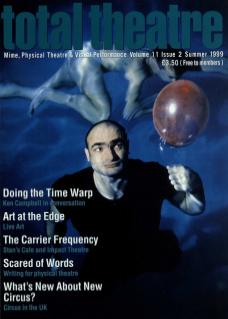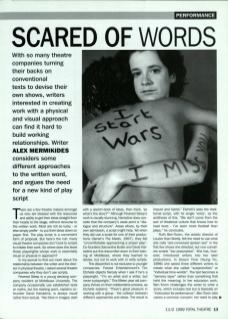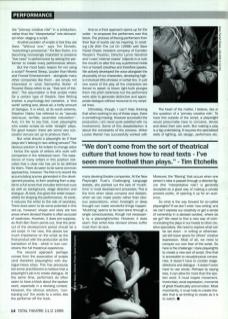There are a few theatre-makers amongst us who are blessed with the resources and ability to get their ideas straight from their heads to the stage, without recourse to the written word. Most are not so lucky – or else simply prefer to put their ideas down on paper first. The play script is a convenient form of proposal. But here's the rub: many visual theatre companies don't look to scripts to initiate their work. So where does this leave those playwrights whose work is essentially visual or physical in approach?
In my pursuit to find out more about the relationship between the writer and the deviser in physical theatre, I asked several theatre companies why they don't use scripts.
Fevered Sleep is a young devising company resident at Middlesex University. The company occasionally use established texts or myths, but the starting point, explains co-founder David Harradine, is always visual rather then textual. ‘We think in images; start with a sketch-book of ideas, then think, “so what's the story?”’ Although Fevered Sleep's work is visually stunning, Harradine does concede that the company's weak point is ‘dialogue and structure’. Areas where, by their own admission, a script might help. Yet when they did use a script for one of their productions (Genet's The Maids, 1997), they felt ‘uncomfortable approaching a proper play’. Co-founders Samantha Butler and David Harradine put this discomfort down to their training at Middlesex, where they learned to devise, but not to work with or write scripts.
This discomfort is not exclusive to younger companies. Forced Entertainment's Tim Etchells objects fiercely when I ask if he's a playwright. ‘I'm an artist and a writer, but never a playwright.’ This fifteen year old company thrives on their collaborative process, as Etchells explains: ‘There's great pleasure in working with a group – the collision between different approaches and ideas. The result is impure and hybrid.’ Etchells sees the traditional script, with its single 'voice', as the antithesis of this. ‘We don't come from the sort of theatrical culture that knows how to read texts – I've seen more football than plays,’ he concludes.
Ruth Ben-Tovim, the artistic director of Louder than Words, felt the need to use what she calls ‘pre-conceived’ spoken text in the first few shows she directed, but now considers scripts ‘too prescriptive’. She has, however, introduced writers into her later productions. In Dream Time (Young Vic, 1996) she asked three different writers to create what she called ‘subjectivities’ or ‘individual time-worlds’. The text becomes a ‘sensory layer’ rather than something that held the meaning. In her education work, Ben-Tovim challenges the writer to write a score, which includes text but is basically an ‘instruction for performance’. Ben-Tovim also voices a common concern: her need to play the ‘primary creative role’ in a production, rather than the ‘interpretative’ role demanded when staging a script.
Another problem of scripts is that they are fixed. ‘Without one,’ says Tim Etchells, ‘everything's provisional.’ For Ben-Tovim, it is becoming increasingly important to preserve ‘live-ness’ in performance by asking the performer to create every performance afresh.
But the most basic reason for not using a script? Fevered Sleep, Louder than Words and Forced Entertainment – alongside many other companies like them – are simply not interested in what Samantha Butler of Fevered Sleep refers to as ‘that sort of theatre’. The assumption is that scripts make for a certain type of theatre. New Writing implies a psychology-led narrative, a ‘this world’ setting and, above all, a hefty amount of dialogue. It is what, at its worst extreme, Stephen Daldry has referred to as ‘pseudo televisual, terrible, seventies naturalism’. And, it's fair to say that most playwrights who create scripts do write ‘straight' plays. For good reason: there are some very successful venues set up to produce them.
"We don't come from the sort of theatrical culture that knows how to read texts – I've seen more football than plays." – Tim Etchells
But what should a playwright do if their plays don't belong in new writing venues? The obvious solution is for writers to change sides – hence the spate of writers who work with companies in the rehearsal room. The experience of many writers in this position indicates that a clear role has yet to be defined for them. There do seem to be some common approaches, however. The first is to record the accumulating scenes generated in the development process, to form anything from a playlist to a full score that includes technical cues as well as background, stage direction and dialogue. At best, this gives the writer responsibility for shaping the performance. At worst, it reduces the writer to the role of secretary. There does seem to be some potential in this set-up, however; shape and story are two areas where devised theatre is often accused of weakness. However, it does pre-suppose, as Ruth Ben-Tovim points out, that the product of the development period should be a set script. In her view, this places too much importance on the script as the final product with the production as the translation of this – which in turn constrains the full theatrical experience.
The second approach perhaps comes from the association of scripts (and therefore playwrights) with dialogue-heavy plays. This has previously led some practitioners to believe that a playwright's job is to create dialogue. At the same time, performers do often seem to have a block about the spoken word, especially in a devising context. However, the obvious solution, 'contracting out’ the words to a writer, lets the performer off the hook.
And so a third approach opens up for the writer – to empower the performers over this block. The process of freeing performers from their fear of words can be inspiring. In creating Life With The Lid On (1998) with Bare Faced Cheek (resident company of Camden People's Theatre), Director Lynne Kendrick and I used ‘internal masks' (objects in or over the mouth) to alter the way a performer holds him or herself, breathes and therefore speaks. We actively developed the voice alongside the physicality of our characters, developing highly individual little phrases or verbal tics. In just one scene of the play all the characters are forced to speak (a blown light-bulb plunges them into pitch darkness) but the performers were able to generate distinctive and appropriate dialogue without recourse to my scripted lines.
Ultimately, though, I can't help thinking that when working in any of these ways, there is something missing. However successful the production, I am never quite satisfied with my involvement. Some of this dissatisfaction is about the constraints of the process. Writer Louise Warren has successfully worked with many devising theatre companies. At the New Playwright Trust's Challenging Language debate, she pointed out the lack of 'mulch-time' in most development processes. This is the time when ideas compost and deepen, when we can make poetic rather than obvious associations, when hindsight or deep thought can make wonderful things happen. 'Mulching' seems to be best done through a single consciousness, though not necessarily by a playwright/writer. However, it does seem that writer-less devised shows suffer most from its lack.
The heart of the matter, I believe, lies in the question of a ‘primary creative role'. To have this outside of the script, a playwright would presumably have to conceive, devise and direct their own work. But making a play is a big undertaking. It requires the specialised skills of lighting, set design, performers, etc.
Moreover, the filtering that occurs when one person's idea is passed through a director-figure (the 'interpretative role') is generally accepted as a good way of making a private process public, of opening it up for an audience.
So what is the way forward for so-called playwrights? If we don't write 'new writing’ and we can't express our creativity or get a sense of ownership in a devised context, where do we go? We need to find a new way of communicating the plays in our heads to other creative specialists. We need to explore what can be set down – in writing or otherwise – yet still leave space for others' creative expression. Most of all, we need to conquer our own fear of the script. So here is the challenge: I dare playwrights to create a new sort of script. One that is accessible to visual physical companies. It doesn't have to contain stage directions and dialogue – it doesn't even have to use words. Perhaps by saying less, it can allow for more than the spoken word. It must inspire movement, involuntary vocal expression, moments of great theatricality and emotion. Most importantly, it must help to create theatre that is as thrilling to create as it is to watch.


